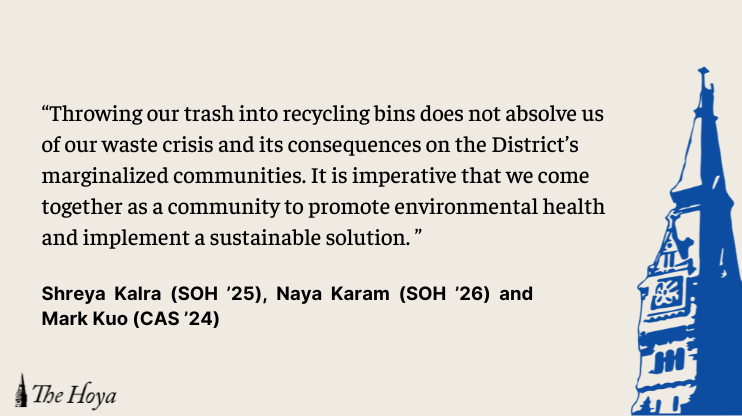The state of recycling in the District is rubbish.
Communities in Wards 7 and 8, regions east of the Anacostia River, are disproportionately subjected to the health disparities associated with low recycling rates and inefficient recycling procedures in Washington, D.C.
Throwing our trash into recycling bins does not absolve us of our waste crisis and its consequences on the District’s marginalized communities. It is imperative that we come together as a community to promote environmental health and implement a sustainable solution.
As it stands, D.C.’s projected plastic recycling rate for 2023 is a mere 6.5%, which is staggeringly lower than the 32% national average.
Like Georgetown University, the District uses single-stream recycling, which frequently causes impure material and backlogs that cannot be recycled and are instead redirected to landfills.
Recycling and trash are processed at D.C.’s Fort Totten and Benning Road waste transfer stations, which are surrounded by predominantly Black neighborhoods. Waste products such as microplastics and heavy metals also pollute our rivers, making the water unsafe.
Unfortunately, improper waste processing is far too common in disadvantaged communities. For example, waste mismanagement has polluted the Anacostia watershed at levels too dangerous for many forms of recreational water activity. The Anacostia River even failed its 2022 water quality assessment, scoring a 63% for trash, a 62% for toxics and a 42% for aquatic vegetation.
Transferred waste from the District is then sent to the Covanta Fairfax Trash Incinerator in Lorton, Va., which is located in a low-income, minority community within Fairfax County. These hazardous waste sites are often built in vulnerable communities with diminished political capital to fight unwanted construction.
It is no coincidence that low-income communities receive the brunt of our waste’s environmental impact on health.
Furthermore, waste transfer stations are a source of airborne mercury and disease vectors. Covanta Fairfax accounts for 75% of the county’s industrial air pollution and releases more lead, sulfur dioxide, nitrous oxide and dioxin than a coal power plant. These pollutants exacerbate a range of health conditions from asthma to neurodevelopmental disease.
Despite this, hope is not lost.
For instance, the Return, Refund and Recycle Coalition for D.C. (3RC for D.C.) is a coalition of environmental and community groups that advocate for a return-refund-recycle system here in the District. Members such as the Sierra Club, D.C. Environmental Network and Anacostia Riverkeeper have fought to urge the City Council to pass a bottle deposit law.
In this system, customers would pay a small charge included in the cost of their bottled or canned drink. These recyclable bottles could then be returned to stores, local redemption centers or reverse vending machines in exchange for the original deposit.
These efforts aren’t novel.
Check a soda can right now, and you will likely find 5 cent or 10 cent labels along with state abbreviations for Maine, Michigan, New York and other states where bottle deposit efforts have been implemented. As of 2021, Michigan and Maine saw bottle redemption rates upwards of 75%.
Many doubt the profitability of bottle return systems.
For instance, in Maine, redemption centers make 4.5 cents for every bottle returned, which some argue has led to financial issues in the state. These concerns are valid, but overinflated. By setting an adequate deposit value and adjusting that value for inflation, the public can be successfully incentivized to return their bottles.
Despite concerns, bottle returning can be both convenient and cost-effective if officials place return locations in strategic sites, especially for those who may not have access to curbside recycling. The Sierra Club is working with parishes and community organizers in Wards 5, 7 and 8 to establish redemption centers at their local parking lots and other convenient community hubs.
The alternative to not passing a bottle deposit bill paints a bleak portrait of our future. It is a health risk in and of itself.
Recycling alone will not resolve our reliance on plastics and other waste material. Instead, increased and successful recycling will significantly reduce reliance on the harmful manufacturing of new plastics from hazardous chemicals.
We must critically evaluate the sources of our waste and examine the efficacy of our current recycling programs.
3RC for D.C. and our organization, the Georgetown Undergraduate Environmental Health Collaborative, are campaigning at Georgetown and in surrounding communities to garner signatures and apply pressure to implement the bottle deposit law.
Those with the means to do so can also make donations to organizations such as the Container Recycling Institute to help fund their efforts toward implementing this program. It is a necessary first step to protect the health of our communities and the safety of our environment.
Shreya Kalra is a junior in the School of Health, Naya Karam is a sophomore in the School of Health, and Mark Kuo is a senior in the College of Arts & Sciences.














